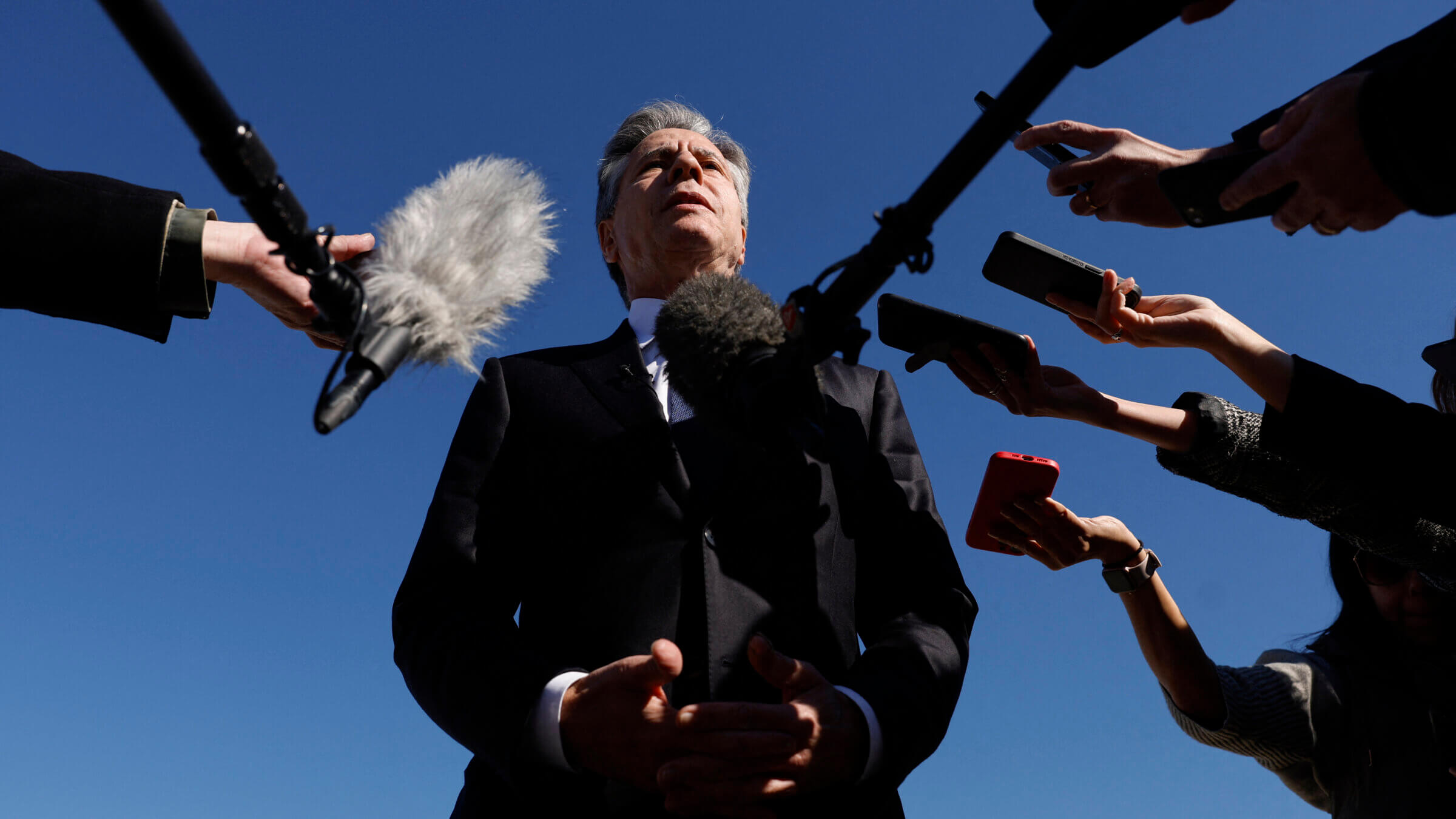The U.S. has called for a ‘humanitarian pause’ in the war against Hamas — what, if anything, does that mean?
The word ‘pause’ has a different connotation than ‘cease-fire’ and its definition is elusive

Secretary of State Antony Blinken talks to reporters prior to boarding his aircraft at Joint Base Andrews in Maryland, on his way to the Middle East and Asia. Photo by Getty Images
During a meeting last Friday with Prime Minister Benjamin Netanyahu, Secretary of State Antony Blinken urged him to agree to a “humanitarian pause” in the war against Hamas, which would allow essential aid to enter Gaza and boost hostage negotiations. Not surprisingly, Netanyahu rebuffed the request, declaring shortly after on Israeli television that Israel rejects any “temporary cease-fire that does not include the release of our hostages.”
Underscoring that point, an Israeli missile hit an ambulance that same day near the entrance to Al-Shifa hospital in Gaza City. The Israeli military announced the ambulance was used by Hamas, while hospital authorities announced that the missile killed 13 people. Inevitably, neither claim could be established independently.
For that matter, it is also hard to establish the actual meaning of the phrase “humanitarian pause.” Just as the Hague and Geneva conventions codify how nations make war, so too do they classify how countries make peace. When it comes to the latter process, there are several options used by nations. They range from a cease-fire (the term employed by Netanyahu) through a limited armistice to a full armistice, each of which brings the killing to an end for varying durations and specifications. But pauses, humanitarian or otherwise, do not seem to merit even a footnote in the conventions.
“The term has been used before,” Samuel Moyn, a professor of history and international law at Yale, told me. But, he continued, “it has no real meaning, especially as a legal matter.”
Moyn implied that Blinken is talking the talk, but not walking the walk of peace-making. “He wants to hold the line since from the first he has not wanted Israel to feel pressure to end hostilities,” Moyn observed. “Saying ‘humanitarian pause’ is a way of placating critics of civilian death without suggesting that he believes the violence should stop before Israel’s aims are achieved.”
The phrase reminds us that if, as Clausewitz said, war is politics by other means, politics, as George Orwell kind of said, enable war by linguistic means. The Biden administration, transfixed between America’s vital political commitment to Israel’s security and the world’s visceral moral response to Palestinian deaths, seems to have little more than words to offer.
Yet these words, which make for an odd, if not quite oxymoronic pair, are well worth pausing over. When I think of “pause,” I think of televised sports, especially football. Periodically, the announcer will tell us there’s a “pause in the action” or “let’s pause for a word from our sponsors.” This allows the coaches to review their strategy, viewers to repair to their fridges, and advertisers to retail their wares. Like the Pepsi we might find in those fridges, we are offered a “pause that refreshes.” And once the pause ends, the bashing of bones and cracking of skulls on the gridiron again begins.
On the rubble-strewn streets of Gaza, however, there are no rules and no referees. Should there be a pause, it will depress, not refresh. Depress because what was taking place before the pause is inhuman; depress because what will take place after the pause is inhuman. Depress because the pause will be infinitely too brief for those living in Gaza who will be treated like humans. And depress because it will be infinitely too long for those of us not living in Gaza or Israel, giving us pause to reflect on this series of horrors, beginning with Hamas’ slaughter of 1400 men, women, and children for the crime of being Jewish.
The etymology of “pause” is uncertain. It derives from the ancient Greek pausis, which means stopping or ceasing. By the late Renaissance, however, it came to acquire an ethical as well as moral sense suggesting a hesitation inspired by doubt. Thus, the import of phrase “to give one pause.” Tragically, just as the nature of the Hamas slaughter has not given pause to many pro-Palestinian protestors, the nature of the military response has not given pause to the Israeli government. A few days ago, the Defense Minister, Yoav Gallant, defined the war’s goal as the creation of “an unconventional picture in Gaza through conventional means.” What might this odd turn of phrase mean?
As another meaning of pause suggests, this question will soon enough to answered. In musical notation, there is a variety of pause markings, ranging from the fermata — an arc over a dot — to a caesura, two slanted lines often called “railroad tracks.” The latter notation inserts a short silence in a musical line, a silence that usually ends as suddenly, even explosively, as it begins.
The fermata, however, insists on the opposite of the caesura: to hold, not halt, the moment. It instructs the musician to maintain a single note. The prolonged note allows the listener, and the player, to take stock of the music. It represents a kind of musical crossroads, pivotal in shaping the sounds to come. Crucially, the note is held for as long as the musician or conductor need to feel how the moment needs to be resolved. Should a “humanitarian pause” come to pass, may the musicians hold that note long and hard.
















